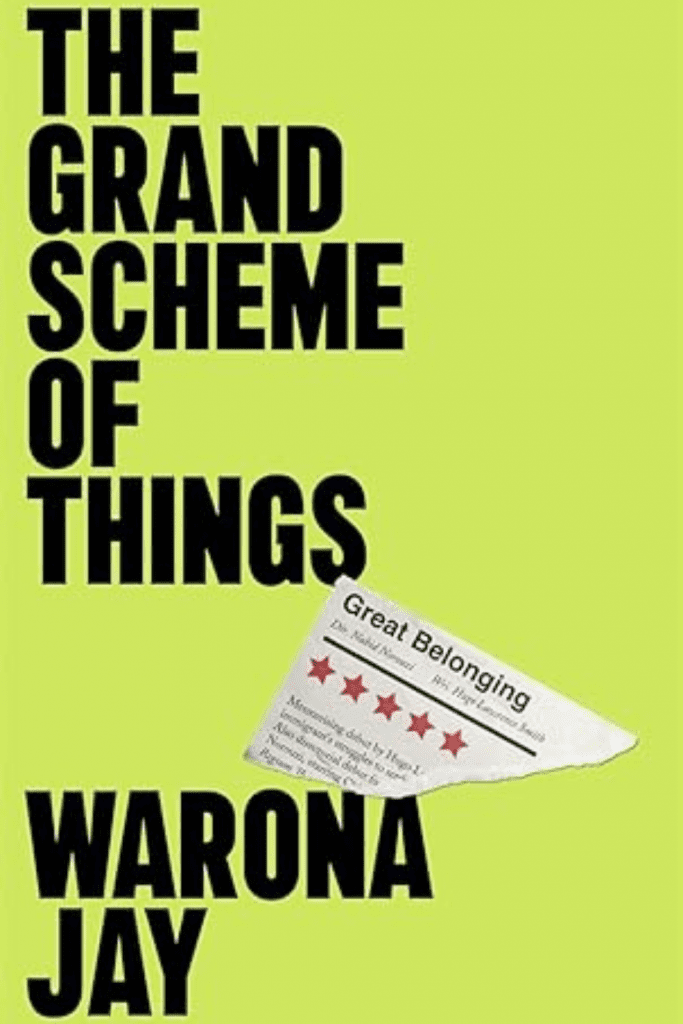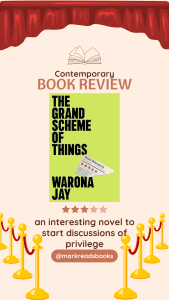A book review of The Grand Scheme of Things Warona Jay, finds a book that may have a few flaws, however it is still worth reading because of its message

| Title | The Grand Scheme of Things |
| Writer | Warona Jay |
| Publisher | Footnote Press |
| Publication date | 12th September 2024 |
| MBR star rating /5 | ⭐⭐⭐ |
| Genre | Literary Fiction, Women’s Fiction, Contemporary, BLM |
Warona Jay
fact sheet
Tags
Synopsis: The Grand Scheme of Things
A daring con, a powerful friendship, and a world ready for exposure.

In The Grand Scheme of Things, Warona Jay delivers a sharp, thought-provoking, and wildly entertaining debut that explores the complexities of race, success, and ambition within the cutthroat world of theatre. The novel follows two unlikely partners-in-crime as they devise an audacious plan to take on systemic bias and break into the exclusive London theatre scene—by any means necessary.
Meet Relebogile Naledi Mpho Moruakgomo, or “Eddie” for short. Eddie is a talented playwright with grand dreams of seeing her stories brought to life on London’s biggest stages. But there’s one glaring problem: her name. After endless rejections, Eddie begins to suspect that her non-white name is a barrier in an industry where gatekeepers are overwhelmingly white, and diversity is often seen as a checkbox rather than a commitment. Frustrated and disillusioned, she refuses to give up on her passion and looks for a way to beat the system that’s holding her back.
Enter Hugo Lawrence Smith, a privileged, charismatic, and effortlessly charming white man with connections Eddie could only dream of. Despite his privilege, Hugo is unhappy with his life as a law student, shackled to a future in corporate law that holds little appeal. A chance meeting at a café sparks an unexpected friendship between Eddie and Hugo, and together they form a bond over their shared frustrations and mutual desire to break free from the paths society expects them to follow.
Out of this friendship comes an idea—one that is bold, daring, and potentially career-making for both of them. The plan? They’ll submit Eddie’s play under Hugo’s name, capitalizing on his whiteness and the theater world’s unspoken biases. Once the play hits success, they’ll reveal the truth: that Eddie, a Black woman, is the true author, and in doing so, expose the industry’s deep-seated racism and hollow pursuit of clout.
But as their plan unfolds and Eddie’s play gains traction, the stakes rise higher than either of them anticipated. The duo begins to encounter challenges they hadn’t planned for: the intoxicating allure of success, the temptations of fame, and the pressures of maintaining the secret behind their scheme. Will Eddie and Hugo stick to the plan, or will the deceit—and the pull of personal gain—fracture their partnership?
As the success of the play grows, so do the tensions between Eddie and Hugo. The line between friend and foe blurs, as both begin to question not only their roles in the scheme but their values and motives. Eddie is forced to confront whether achieving her dreams on these terms will be enough, while Hugo struggles with the question of whether he is truly as selfless and supportive as he wants to be—or if he’s just another opportunist using Eddie’s talent for his own advantage.
At its heart, The Grand Scheme of Things is more than just a story about theater or trickery—it’s a piercing look at how identity, privilege, and success are intertwined in today’s society. Through Eddie and Hugo’s journey, Warona Jay examines themes of authenticity, the pressures of living up to societal expectations, and the double-edged sword of ambition.
With biting wit, insight, and a rollercoaster of twists, The Grand Scheme of Things is an unmissable debut that challenges readers to think about what success really means, and what we’re willing to sacrifice to achieve it. Perfect for fans of stories about friendship, ambition, and the hidden biases lurking beneath the surface of creative industries.
Review: The Grand Scheme of Things

Warona Jay’s The Grand Scheme of Things sets out to tackle contemporary issues of privilege, race, and identity, particularly within the high-stakes world of theater.
following two unlikely friends—Eddie, a talented Black playwright, and Hugo, a privileged white law student.
As they scheme to expose the racial biases and systemic barriers of London’s theatre industry.
While the premise is timely and thought-provoking, the novel stumbles at points, leaving readers with a mixed experience.
The Plot and Characters
The story centers on Relebogile Naledi Mpho Moruakgomo, known as Eddie, a young woman from Botswana navigating the struggles of being a Black playwright in a predominantly white theatre industry.
Fresh out of London’s top drama school, Eddie faces rejection after rejection, and she begins to suspect that her African name is part of the problem.
Her suspicions are confirmed when, after submitting her play under a more “white-sounding” pseudonym, she finally catches the industry’s attention. Only for the opportunity to be taken away once she reveals her true identity.
Enter Hugo, a privileged, bored law student trapped in his family’s expectations. The two meat by chance.
Now a year later they hatch a plan: Hugo will submit Eddie’s play under his name, allowing it to be judged on its merits without the baggage of racial bias.
Once the play gains success, they will reveal the truth and expose the industry’s flaws. However, as their plan unfolds, they discover that exposing the system is not as straightforward as they hoped.
What begins as an empowering act of rebellion soon spirals into a whirlwind of moral dilemmas, emotional consequences, and unexpected setbacks.
Themes of Privilege and Race
At its core, The Grand Scheme of Things grapples with the intersections of race, privilege, and success. Eddie’s experience highlights the insidious nature of racial bias in creative industries. Where a person’s name or background can determine the doors that open—or slam shut—in front of them.
Hugo, on the other hand, embodies the ease with which privilege can open those same doors, even when the talent or passion isn’t there.
Warona Jay skilfully uses the theatre world as a microcosm of society, exploring how privilege, both visible and invisible, operates at every level of success.
The novel raises important questions about the value of authenticity, the compromises marginalized people are forced to make to succeed, and whether the ends always justify the means.
Does the Novel Work as a Contemporary Issue Drama?
While The Grand Scheme of Things aims to address critical social issues, the novel’s execution can feel uneven.
One of issue lies in the novel’s use of real-world events like Brexit to ground the story in a specific time. with the narrative starting before the 2016 Brexit referendum adds political context.
Having said that at, the emphasis on this historical moment feels forced, detracting from the core themes of identity and systemic racism in the arts.
Another questionable narrative choice involves a subplot featuring a character who has written a story set in space, reminiscent of well-known fantasy franchises.
While it’s clear this character is meant to provide contrast or commentary on the real world with this kind of success in the industry.
The presence feels of them felt superfluous. As the subplot doesn’t tie into the main storyline in a meaningful way. Leaving readers to wonder what purpose did it serves. In the novels themes of race and privilege.
Missed Opportunities and Character Depth
The novel’s most significant missed opportunity lies in its treatment of secondary characters. While Eddie’s journey is the emotional centre of the story.
Many of the side characters, including close friends in Eddie’s life, remain underdeveloped.
Including Hugo, who is written as a privileged white man, which he is but even though the narrative is told from his point of view, he feels almost one dimensional for such a key character in the book.
In addition, a minor character from Liverpool is included, but the heavy focus on her accent feels odd in a novel about identity. Without delving deeper into what that identity means for the story. This lack of depth reduces the impact of some of the themes. Particularly those relating to class and regionalism in the UK.
Given that The Grand Scheme of Things sets out to interrogate identity and privilege, the story could have done more to flesh out the different ways those concepts manifest across characters.
Identity is not just about race or privilege. It is also about how individuals move through the world based on factors like accent, class, and regional background.
Final Thoughts: The Grand Scheme of Things Worth Reading
The novel scratches the surface but misses the opportunity to fully explore these nuances having said that adding more diversity to the novel would have hidden or even deleted the message the author wanted to say .
Despite its flaws, The Grand Scheme of Things is an engaging and thoughtful debut that succeeds in sparking conversations around privilege and race. Particularly within the arts.
Warona Jay’s novel isn’t without its clunky moments—the plotting can feel uneven, and some of the characters remain underdeveloped—but the central premise is powerful and timely.
For readers interested in contemporary issue-driven fiction, particularly those who want to explore how race and privilege operate in the theatre world. The novel provides a compelling, if imperfect, read.
It is a thought-provoking examination of how success is shaped by societal biases and how even the best-intentioned plans can unravel in unexpected ways.
The Grand Scheme of Things is not be a flawless read by any means. It is an important one none the less as it examines how power, race, and privilege intersect in ways that often go unseen.
Mainly because they are hidden in plain sight..
Meet : Warona Jay

Born in Botswana and raised in the West Midlands, UK, Warona Jay studied Law at the University of Kent and King’s College London before switching to a Creative Writing PhD at Brunel. She was shortlisted for the Sony Young Movellist of the Year Award judged by Malorie Blackman as a teen, and longlisted for Penguin Random House’s WriteNow Scheme in 2020. Her debut novel

If you wish to read more Insightful Book Reviews then check the link hew
or you can add to your GoodReads TBR
Like follow or share if you would want similar content.
Above all Keep Safe and treat people fairly.
Mark.